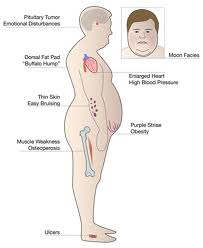What is Cushing Syndrome? How to manage it? What are the precautions to be taken? What are the signs and symptoms? What is the cause of this disease? How to treat it? How can homeopathy help you? All of this answered, in this post and of course our doctors always there to help you. Just fill in your details in the form down below and we will answer all your questions for FREE!

What is Cushing’s Disease?
Cushings syndrome is a disorder that results when body tissues are exposed to high level of corticosteroids over a long period of time. It occurs either because pituitary gland releases a large amount of adrenocorticotrophic hormone (ACTH) that causes the adrenal glands to produce too much cortisol.
Cushings syndrome has characteristic signs, such as a rounded moon-face, fatty hump between shoulders and pink or purple stretch marks on the skin, facial plethora and truncal obesity.
A person with Cushing’s syndrome complains of weight gain, hirsutism, Muscle weakness, easy bruising and growth retardation in children.
Adrenal glands are located above each kidney and are responsible for the release of corticosteroids.
Cortisol:Cortisol is a steroid hormone. It is also called adrenal cortical hormone, hydrocortisone or glucocorticoid.
It is known as a stress hormone as it is released in high amount during “fight or flight” response to stress.
Cortisol helps in:
• Maintaining function of heart and blood pressure.
• Slowing down the inflammatory response of an immune system.
• Regulating the fat, proteins and carbohydrate metabolism.
Cortisol is released by adrenal glands that are located on each kidney. The pituitary gland secretes an adrenocorticotropic hormone that controls the release of cortisol by adrenal glands. The level of cortisol is high in the morning and low at night.
The release of cortisol hormone: A part of the brain called hypothalamus sends corticotrophin-releasing hormone (CRH) to the pituitary gland. Under the influence of CRH, the pituitary gland secretes adrenocorticotropin hormone (ACTH) which reaches the adrenal glands. The adrenal glands are located on the top of each kidney, on receiving ACTH they release cortisol hormone in the bloodstream.
What are the causes of Cushing’s Disease?
The reason for the development of Cushings syndrome is prolonged exposure of body tissues to high-level cortisol.
The symptoms of Cushings syndrome are experienced by many people because of intake of glucocorticoid hormones, e.g. prednisone for inflammatory diseases or immunosuppression.
Cortisol is responsible for performing vital tasks in the body. It is responsible for body’s reaction to stress; it helps in maintaining blood pressure and cardiovascular function, regulates the protein, carbohydrate and fat metabolism and reduces the inflammatory response of the immune system.
CRH released by hypothalamus and ACTH released by pituitary gland maintains the appropriate level of cortisol in the blood. It there is something wrong with the adrenal or pituitary gland or hypothalamus, and then there is the imbalance in the production of cortisol hormone.
Following are the conditions that results in high level of cortisol in blood:
• Pituitary adenoma
In most of the cases the pituitary adenoma is responsible for the development of Cushing’s syndrome. Pituitary adenomas are benign tumors; they are responsible for release of increased amount of ACTH.
• Ectopic ACTH syndrome
Ectopic ACTH syndrome is a condition when benign or malignant tumors occur outside the pituitary gland and produces ACTH.
• Adrenal tumors
It also causes Cushing syndrome. These are the benign tumors called adrenal adenomas that releases excess amount of cortisol in blood.
How to know about your signs and symptoms of Cushing’s syndrome?
• Moon face
• Fatty hump between shoulders
• Upper body obesity
• Arms and legs become thin
• Skin becomes fragile
• Stretch marks purple or pink in appearance occurs on skin
• Severe fatigue
• High blood pressure and sugar level
• The patient becomes depressed, anxious and irritable.
• The growth of hair in women on abdomen, face, chest, and thigh.
• Irregularity of menses
• Infertility or libido in men.
How is Cushing Syndrome Diagnosed?
The investigation is done on the basis of patient’s physical examination, medical history, and lab tests.
• X-ray of adrenal and pituitary glands helps in locating tumors.
• 24-hour urinary free cortisol level: Patient’s urine is collected over 24 hours and examined for the level of cortisol. If the level is above 50-100 micrograms a day in adults, it indicates Cushing’s syndrome.
• Dexamethasone Suppression Test: Dexamethasone is synthetic glucocorticoid; a patient is advised to take it orally every 6 hours for four days. Low doses are given for first two days and high doses for last two days. 24-hour urine is collected before administration of dexamethasone and on each day of the test. Normally there is a decrease in the level of cortisol in the blood. But depending on the cause of Cushing syndrome i.e. pituitary tumor or ectopic ACTH there is a different response of cortisol to dexamethasone.
• CRH Stimulation Test: This test helps to distinguish whether the problem is pituitary adenomas, ectopic ACTH syndrome or cortisol-secreting adrenal tumors.
• Radiologic Imaging of endocrine glands: It helps in determining the presence of tumors.
Is Cushing syndrome treatable?
Depending on the reason for the excess of cortisol, treatment includes:
• Cortisol inhibiting drugs
• Surgery
• Radiation
• Chemotherapy
What is the prognosis of Cushing Syndrome?
• Full recovery may be obtained by removing the tumor through surgery but there are chances of recurrence.
• If the condition is left untreated it can be life-threatening.
What are the complications of Cushing Syndrome?
• Diabetes
• Hypertension
• Fractures
• Infection
• Kidney stones
How to Differentiate Cushing Syndrome from other diseases?
• Obesity
• Anorexia nervosa
• Bulimia
• Depression
• Alcoholism
What are the commonly indicated Homeopathy remedies for Cushing’s syndrome?
Few remedies for treating Cushing syndrome symptomatically are:-
-Calc Carb
-Graphites
-Berberis Vulgaris





